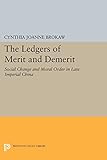The Ledgers of Merit and Demerit : Social Change and Moral Order in Late Imperial China / Cynthia Joanne Brokaw.
Material type: TextSeries: Princeton Legacy Library ; 1180Publisher: Princeton, NJ : Princeton University Press, [2014]Copyright date: ©1991Edition: Course BookDescription: 1 online resource (300 p.)Content type:
TextSeries: Princeton Legacy Library ; 1180Publisher: Princeton, NJ : Princeton University Press, [2014]Copyright date: ©1991Edition: Course BookDescription: 1 online resource (300 p.)Content type: - 9780691608792
- 9781400861941
- 170.95109031 20
- BJ117
- online - DeGruyter
- Issued also in print.
| Item type | Current library | Call number | URL | Status | Notes | Barcode | |
|---|---|---|---|---|---|---|---|
 eBook
eBook
|
Biblioteca "Angelicum" Pont. Univ. S.Tommaso d'Aquino Nuvola online | online - DeGruyter (Browse shelf(Opens below)) | Online access | Not for loan (Accesso limitato) | Accesso per gli utenti autorizzati / Access for authorized users | (dgr)9781400861941 |
Browsing Biblioteca "Angelicum" Pont. Univ. S.Tommaso d'Aquino shelves, Shelving location: Nuvola online Close shelf browser (Hides shelf browser)
Frontmatter -- Contents -- Acknowledgments -- Abbreviations -- Introduction -- CHAPTER ONE. Merit Accumulation in the Early Chinese Tradition -- CHAPTER TWO. Merit Accumulation for Status Advancement -- CHAPTER THREE. The Debate over Supernatural Retribution and Merit Accumulation -- CHAPTER FOUR. Preserving the Social Hierarchy in the Seventeenth and Eighteenth Centuries -- Conclusion -- APPENDIX. Extant Morality Books and Ledgers of Merit and Demerit Published in the Seventeenth and Eighteenth Centuries -- Glossary -- Sources Cited -- Index
restricted access online access with authorization star
http://purl.org/coar/access_right/c_16ec
The ledgers of merit and demerit were a type of morality book that achieved sudden and widespread popularity in China during the sixteenth and seventeenth centuries. Consisting of lists of good and bad deeds, each assigned a certain number of merit or demerit points, the ledgers offered the hope of divine reward to users "good" enough to accumulate a substantial sum of merits. By examining the uses of the ledgers during the late Ming and early Qing periods, Cynthia Brokaw throws new light on the intellectual and social history of the late imperial era. The ledgers originally functioned as guides to salvation for twelfth-century Taoists and Buddhists, but Brokaw shows how the literati of turbulent sixteenth-century China began to use them as aids in the struggle for official status through civil service examinations. The author describes how the responses of some Confucian thinkers to the popularity of the ledgers not only refined the orthodox Neo-Confucian method of self-cultivation but also revealed the serious ambiguity of the classic Confucian understanding of the relationship between fate and human action. Finally, she demonstrates that by the end of the seventeenth century the ledgers were used not so much to facilitate upward mobility as to promote social stability by prescribing standards that encouraged people to keep to their social places.Originally published in 1991.The Princeton Legacy Library uses the latest print-on-demand technology to again make available previously out-of-print books from the distinguished backlist of Princeton University Press. These editions preserve the original texts of these important books while presenting them in durable paperback and hardcover editions. The goal of the Princeton Legacy Library is to vastly increase access to the rich scholarly heritage found in the thousands of books published by Princeton University Press since its founding in 1905.
Issued also in print.
Mode of access: Internet via World Wide Web.
In English.
Description based on online resource; title from PDF title page (publisher's Web site, viewed 30. Aug 2021)









